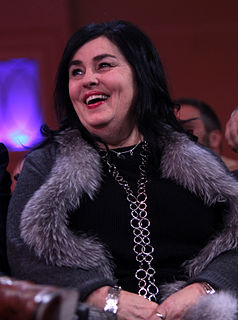A Quote by Feist
Now, there's just so much imagery. Imagine what our grandkids are going to be able to see of us?
Related Quotes
I'd like my grandkids to be able to watch PBS. But I'm not willing to borrow money from China, and make my kids have to pay the interest on that, and my grandkids, over generations, as opposed to saying to PBS, 'Look, you're going to have to raise more money from charitable contributions or from advertising.'
There is psychological pleasure in this takeoff, too, for the swiftness of the plane’s ascent is an exemplary symbol of transformation. The display of power can inspire us to imagine analogous, decisive shifts in our own lives, to imagine that we, too, might one day surge above much that now looms over us.” P. 38-39
The pure love of Christ can remove the scales of resentment and wrath from our eyes, allowing us to see others the way our Heavenly Father sees us: as flawed and imperfect mortals who have potential and worth far beyond our capacity to imagine. Because God loves us so much, we too must love and forgive each other.
For me, I look at the faces of my kids and I think about the future that is going to await them and whether they're going to not just have the financial resources to be prepared for the challenge, but whether they're going to have the strength and the stamina to live healthier, longer lives so that they can see their kids and grandkids. That's the legacy I hope to see, and it can have nothing to do with me and I'd be perfectly happy.
We imagine going to the moon and planting a flag, going to an asteroid and mining, going to Mars and setting up a colony. And I think that expansionist mentality is very self-destructive, especially given the kind of precarious relationship we now have to the ecosystem here on Earth, because it allows us to imagine that Earth is disposable.
It is very important for I think those of us who desperately want peace, who see war as, at some level, a break-down, a manifestation of human weakness, to understand that sometimes it’s also necessary – and you know, to – to be able to balance two ideas at the same time; that we are constantly striving for peace, we are doubling up on our diplomacy, we are going to actively engage, we are going to try to see the world through other people’s eyes and not just our own.
I tell my kids and my grandkids, 'Never forget where you came from. Never forget your roots.' My grandkids, they didn't go through the hard times as much as other ones in our family did. One thing is to just never forget where you came from and you never forget that nothing is more important than your relationship with Jesus Christ.
Our lives are now in a telephone, all our data, all our finances, all our personal information, and so it's proper that we have some constraints on that. But it's not going to be 100 percent. If it is 100 percent, then we're not going to be able to protect ourselves and our societies from some people who are trying to hurt us.


































